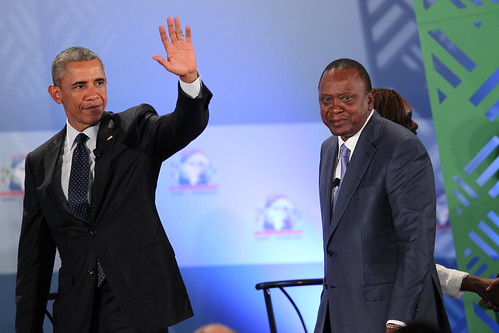美國總統歐巴馬造訪其父親的故鄉肯亞時表示,將禁止美國境內所有州際的象牙貿易,以保護受盜獵威脅的非洲象。
 |
| 美國歐巴馬與肯亞總統肯亞塔(Uhuru Kenyatta)。圖片來源:U.S. Embassy Nairobi(CC BY-NC 2.0) |
15分鐘死一隻大象 全球象牙市場中、美居首
歐巴馬宣布,美國魚類及野生動物管理局正提案禁止美國州際幾乎所有象牙貿易,並進一步限制商業出口。此舉加上歐巴馬政府以實施的其他相關措施,等於近乎禁止了全美境內的所有非洲象牙貿易。
去年歐巴馬政府頒佈打擊野生動物盜獵的行政命令。但儘管如此,美國仍是全世界第二大象牙市場,僅次於中國。
2013年歐巴馬的行政命令指出,野生動物走私影響野生動物的經濟、社會和環境價值,每年卻創造數十億美元的非法獲利,助長非法經濟、造成政局動盪並威脅區域安全。
為了供給全球象牙黑市,目前的盜獵犯平均每15分鐘就殺害一頭大象,導致非洲象瀕臨絕種。2010到2012年間,近100,000頭大象因象牙盜獵被殺害。大象屍體遍佈非洲主要國家公園,連過去以為是大象的庇護所的地方也不例外。
歐巴馬頒新禁令 現存製品仍可貿易
去年,美國魚類及野生動物管理局已大規模和相關利益團體商談,包括專業音樂家、古董商、收藏家和博物館策展人。
根據相關團體的意見,新政在特定、有限的情況下,允許已經存在的製作品貿易,如樂器、家具和象牙成分少於200克的武器等。
法律定義的古董也不包括在新政限制範圍。根據魚類及野生動物管理局的認定,這些物品的合法貿易與當前的象牙盜獵危機無關。
肯亞建DNA資料庫 45天清查全國象牙、犀角
肯亞野生物署於7月21日開始清查該年度國內象牙與犀牛角的總數。官員依法統計所有國內的象牙與犀牛角總數,包括展覽以及任何合法持有象牙與犀牛角處,包括司法機關、警察機關、海關和野生動物保留地等。
所有象牙與犀牛角以數位技術記錄。該數位技術已在其他非洲象活動範圍國家測試和成功應用。肯亞野生物署和英國非政府組織Stop Ivory合作,提供人員、技術和財務支援給為期45天的清查活動,加上當地大學生的協助。
清查活動蒐集象牙與犀牛角樣本,為全國的大象和犀牛族群建立DNA參考資料庫。DNA資料庫將用於分析肯亞境內和區域的野生動物犯罪法醫學證據。
 |
| 為了供給全球象牙黑市,目前的盜獵犯平均每15分鐘就殺害一頭大象。圖片來源:animalrescueblog(CC BY-NC 2.0) |
President Barack Obama is proposing to forbid the sale of “virtually all ivory across state lines” in the United States.
During his first visit as president to his father’s homeland of Kenya, Obama told reporters Saturday he will restrict the U.S. trade in elephant ivory to protect Africa’s elephants, which are targeted by poachers for sale on the black market.
Obama announced that the U.S. Fish and Wildlife Service is proposing to prohibit most interstate commerce in African elephant ivory and further restrict commercial exports. This action, combined with other actions the Obama Administration has already taken, will result in a near total ban on the domestic commercial trade of African elephant ivory.
The proposed rule builds upon restrictions put in place last year following President Obama’s Executive Order on combating wildlife trafficking. Yet despite existing regulations, the United States is the world’s second-largest market for ivory, behind China.
Poachers currently kill, on average, one elephant every 15 minutes to supply the global black market, threatening the African elephant with extinction.
An estimated 100,000 elephants were killed for their ivory between 2010 and 2012. The carcasses of illegally killed elephants now litter some of Africa’s premiere parks. Elephants are under threat even in areas that were once thought to be safe havens.
As stated in the President’s July 2013 Executive Order, wildlife trafficking reduces the economic, social and environmental benefits of wildlife while generating billions of dollars in illicit revenues each year, contributing to an illegal economy, fueling instability and undermining security.
During the last year, the Fish and Wildlife Service consulted extensively with groups that may be impacted by new trade controls for ivory, including professional musicians, antique dealers and collectors, and museum curators.
Based on consideration of the input from those groups and others, the proposed rule allows specific, limited exceptions for certain pre-existing manufactured items such as musical instruments, furniture pieces, and firearms that contain less than 200 grams of ivory. Antiques, as defined by law, are also exempt from its prohibitions.
The Fish and Wildlife Service recognizes that legal trade in these items does not contribute to the current poaching crisis.
Kenya has begun the annual process of compiling her national stockpiles of elephant ivory and rhino horn in an exercise that was officially launched by the Secretary for Environment and Natural Resources Professor Judi Wakhungu on July 21 at Kenya Wildlife Service headquarters in Nairobi.
Required by law, officials taking an inventory of all ivory and rhino horn stockpiles in the country, including court exhibits and any other that might be held by other agencies by virtue of their legal mandate such as the judiciary, police, Customs, and wildlife conservancies among others.
The inventory is being undertaken using digital technology that has been tested and successfully applied in other African elephant range States. KWS has partnered with Stop Ivory, a UK-based NGO to support the 45 day exercise by offering technical and financial support. Members of the inventory teams have been drawn from KWS and Stop Ivory with support from university students.
The exercise involves collection of elephant ivory and rhino horn samples, which will be used to create a DNA reference library for profiling the national populations of elephants and rhinos. The DNA library will be a central component in analysis of forensic evidence for use in prosecution of wildlife crime not only in Kenya but also in the region.
※ 全文及圖片詳見:ENS
